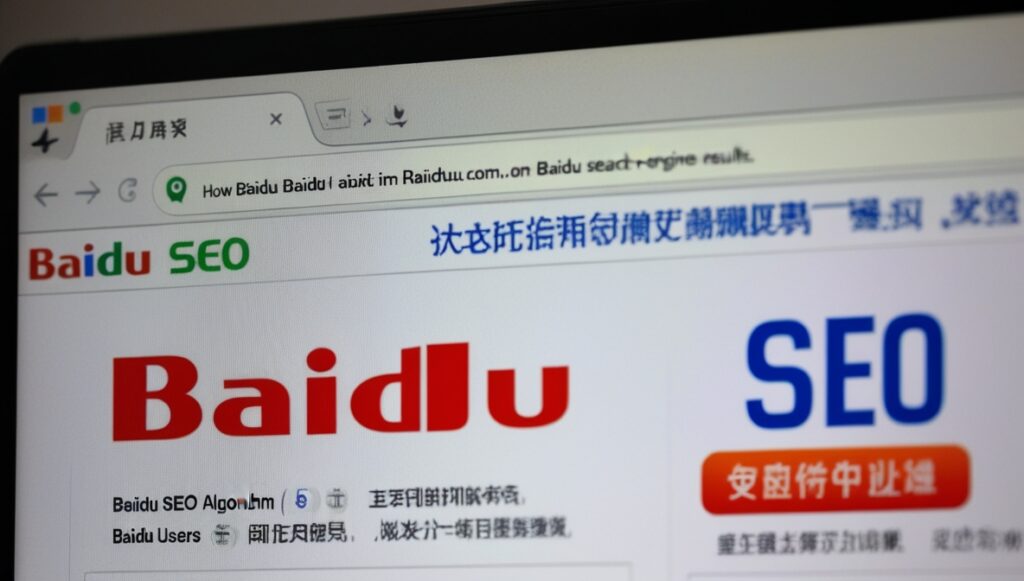
When it comes to digital marketing in China, understanding Baidu SEO is a key factor for success. As the largest search engine in China, with over 70% of the market share, Baidu is the go-to platform for Chinese users seeking information online. While Baidu’s SEO algorithms share similarities with Google’s, they are designed to cater to a different audience, language, and set of cultural expectations. To truly succeed in China’s competitive digital space, businesses need to optimize their websites for Baidu’s unique SEO algorithm.
In this article, we will delve into Baidu’s SEO algorithm, its key factors, and provide practical tips on how to adapt your website to perform well on this search engine. By the end, you’ll have a solid understanding of Baidu SEO and how it differs from other search engines like Google, enabling you to effectively target the Chinese market.
What Is the Baidu SEO Algorithm?

The Baidu SEO algorithm determines how web pages are ranked in Baidu’s search engine results. Like Google, Baidu uses a variety of factors to assess and rank content, but its algorithm is tailored to suit the needs and preferences of Chinese users. This means businesses targeting China must adapt their SEO strategies to meet the specific requirements of Baidu’s algorithm to gain visibility and drive traffic.
Baidu’s algorithm is primarily driven by:
- Localized Search Algorithms
- Content Relevance and Quality
- Technical SEO
- User Engagement and Behavior
- Backlink Profile and Domain Authority
By understanding and optimizing for these factors, businesses can improve their chances of ranking higher in Baidu’s search results and reaching their target audience in China.
Localized Search Algorithms: Baidu’s Focus on Chinese Language and Culture
Localized Search Algorithms: Baidu’s search algorithms are specifically tailored to the Chinese language and cultural nuances. Unlike Google, Baidu places a strong emphasis on local relevance, user behavior, and regional content. This means Baidu’s algorithm prioritizes content that resonates with Chinese users, both linguistically and culturally.
Baidu’s algorithms also take into account local trends, geographic location, and regional variations in language. For example, the search engine might rank content higher if it’s written in Simplified Chinese (the standard form used in mainland China) and uses region-specific phrases or keywords. Content that is highly relevant to Chinese users’ behaviors, preferences, and cultural context tends to rank better than generic content that might work well on global search engines.
Key Factors of Baidu’s SEO Algorithm
To optimize your website for Baidu, it’s important to understand the specific factors that the search engine’s algorithm uses to rank pages. Here are some of the most important elements:
1. Content Quality and Relevance
Just like Google, Baidu’s algorithm values high-quality, relevant content. However, Baidu places a special emphasis on content that is culturally relevant to Chinese users. It’s essential to create content that addresses the unique interests and preferences of your target audience in China.
Additionally, Baidu values local and region-specific content. If your business targets a specific city or province in China, be sure to include location-based keywords and references in your content. This will improve your chances of ranking for searches that are geographically relevant.
2. Chinese Language and Localization
Since Baidu serves a predominantly Chinese-speaking audience, your website needs to be optimized for the Chinese language. While English-language content can still rank, it’s important to use Simplified Chinese for websites targeting mainland China, as this is the standard written form.
Localization goes beyond just translation. It’s about adapting your content to Chinese cultural norms, references, and local practices. This is especially true for industries like e-commerce, entertainment, or travel, where local knowledge can make a huge difference in rankings.
3. User Behavior Signals
Baidu’s SEO algorithm is highly influenced by user behavior data. This includes:
- Click-through rate (CTR): A higher CTR signals that users find your content appealing.
- Time on page: If visitors stay on your page for a long time, it’s a signal to Baidu that your content is valuable.
- Bounce rate: A high bounce rate could indicate poor content or a bad user experience, which could negatively affect rankings.
It’s important to optimize for a positive user experience, ensuring that your site is fast, easy to navigate, and visually appealing.
4. Backlinks and Domain Authority
As with Google, backlinks remain a critical ranking factor for Baidu. However, Baidu places greater importance on local backlinks, especially from authoritative Chinese websites. Links from .cn domains or Chinese news sites, blogs, and forums can significantly boost your website’s credibility in Baidu’s eyes.
Building a strong backlink profile from trusted sources within the Chinese internet ecosystem is crucial for improving your website’s authority and rankings.
5. Mobile Optimization
With the rapid growth of mobile internet usage in China, Baidu places a strong emphasis on mobile-friendly websites. Having a responsive, mobile-optimized website is no longer optional; it’s a must for good Baidu rankings. Google’s mobile-first index is a similar approach, but Baidu’s focus on mobile is especially pronounced due to the mobile-centric nature of Chinese internet users.
How to Optimize for Baidu’s SEO Algorithm
Now that we understand how Baidu’s algorithm works, let’s take a look at some practical steps you can take to optimize your website for Baidu SEO.
1. Conduct Keyword Research for the Chinese Market
Keyword research for Baidu is different from Google’s, as Baidu’s audience uses different search behaviors and terminology. To succeed with Baidu SEO, you need to use Chinese-language keyword tools like Baidu’s Keyword Planner, 5118, or other Chinese platforms.
Focus on:
- Long-tail keywords: Chinese users often search using specific phrases or questions.
- Regional variations: Keywords can differ greatly from one region in China to another, so be sure to localize your keywords.
- Popular search terms: Keep an eye on trending terms in China and incorporate them into your content when relevant.
2. Focus on Content Quality and Localization
As we mentioned earlier, Baidu rewards content that resonates with its Chinese audience. Invest time in creating localized, high-quality content. This includes:
- Writing in Simplified Chinese.
- Adapting your content to reflect Chinese culture, preferences, and social norms.
- Creating content that directly answers the questions Chinese users are searching for.
It’s also important to keep your content fresh and updated, as Baidu tends to favor websites with frequently updated and relevant content.
3. Build a Strong Backlink Profile
Building backlinks from authoritative Chinese websites is a critical component of Baidu SEO. Start by targeting well-respected local sites within your industry or niche. Consider:
- Guest posting on Chinese blogs.
- Participating in local forums and communities.
- Collaborating with Chinese influencers or media outlets.
Ensure that the backlinks are from reputable, high-authority sources, as Baidu is highly sensitive to spammy or low-quality links.
4. Optimize for Mobile
Since mobile traffic is so important in China, make sure that your website is fully mobile-optimized. This means your website should:
- Load quickly on mobile devices.
- Have a mobile-friendly design.
- Ensure that all content, including images and videos, displays properly on mobile screens.
A responsive design that adjusts seamlessly to different devices is a must for Baidu ranking.
5. Improve User Experience (UX)
Baidu uses user behavior signals to evaluate the relevance and quality of your site. To improve your UX, focus on:
- Speed: Ensure your website loads quickly, as slow loading times can hurt your rankings.
- Navigation: Make it easy for users to find information on your site.
- Visual Design: Use clear, attractive visuals and ensure that your website is easy to read and engaging.
Conclusion

The Baidu SEO algorithm may differ from Google’s in several key areas, particularly in its focus on local relevance, the Chinese language, and user behavior signals. However, by understanding these differences and optimizing your website for Baidu’s algorithm, you can significantly increase your chances of ranking higher on China’s largest search engine.
At Dust Digital Marketing Ltd., we specialize in helping businesses optimize their websites for Baidu and succeed in the Chinese market. Our team can guide you through every step of Baidu SEO, from keyword research to content creation and link-building strategies. Contact us today to learn how we can help you drive more traffic from Baidu and expand your digital presence in China!
Call to Action
Ready to unlock the power of Baidu SEO and grow your business in China? Contact Dust Digital Marketing Ltd. for a tailored SEO strategy that will help you rank higher on Baidu and attract more customers from the Chinese market. Let’s get started today!

